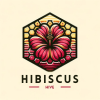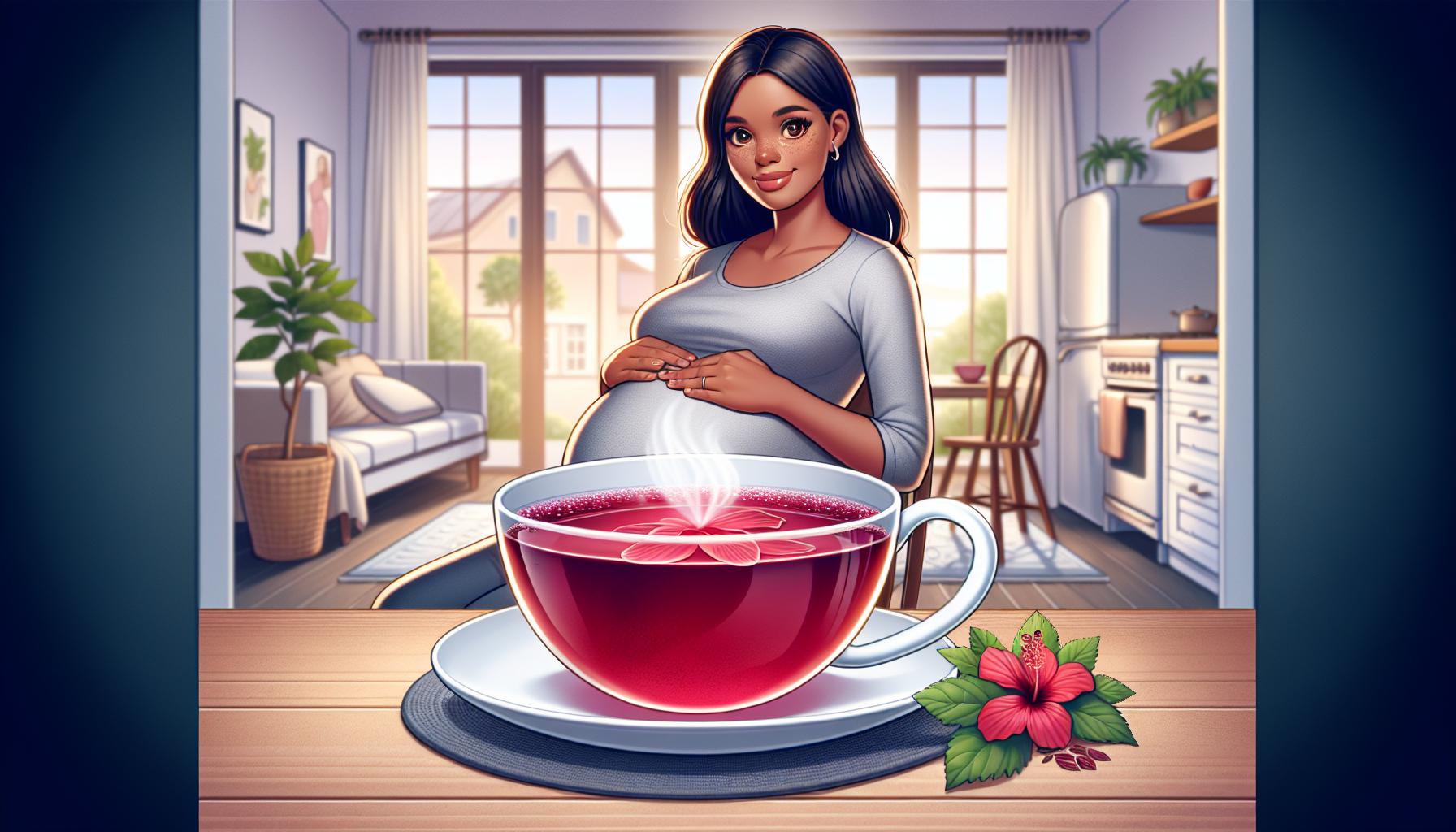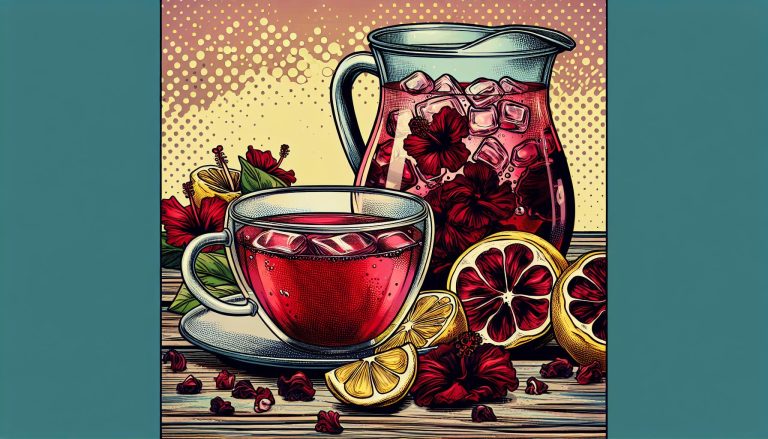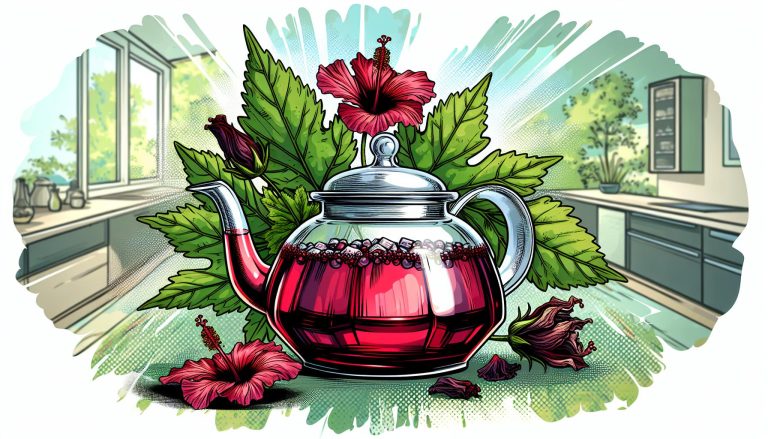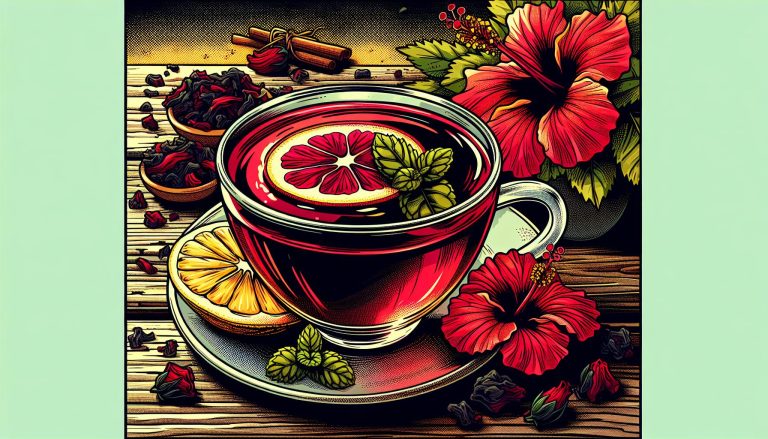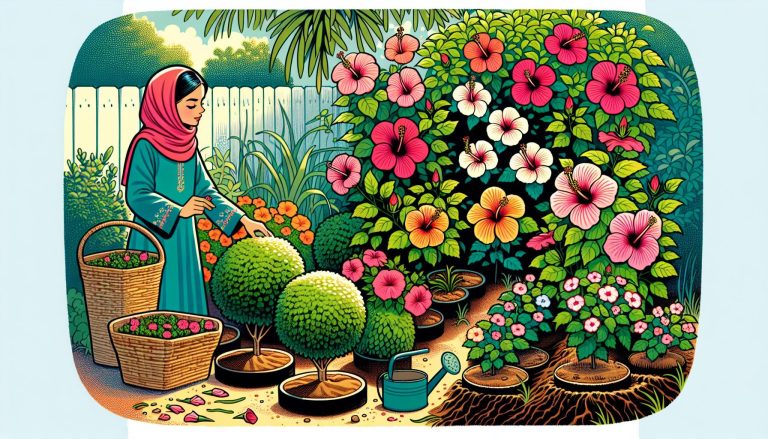Hibiscus Tea During Pregnancy: Safe or Risky? What Experts Say
As a tea enthusiast and health-conscious mom-to-be, I’ve been exploring various herbal teas to enjoy during pregnancy. One question that’s come up frequently is whether hibiscus tea is safe for expectant mothers. It’s a popular beverage known for its tart flavor and potential health benefits, but is it a suitable choice during pregnancy?
I’ll dive into the research surrounding hibiscus tea consumption during pregnancy and share what experts have to say. We’ll explore the potential risks and benefits, as well as alternative options for pregnant women looking for a refreshing and caffeine-free drink. By the end of this article, you’ll have a clearer understanding of whether hibiscus tea should be on your pregnancy-safe beverage list.
What Is Hibiscus Tea?
Hibiscus tea is a vibrant, ruby-red herbal infusion made from the dried calyces of the Hibiscus sabdariffa plant. It’s known for its tart, cranberry-like flavor and is enjoyed both hot and cold in many cultures worldwide.
Health Benefits of Hibiscus Tea
Hibiscus tea offers several potential health benefits:
- Antioxidant-rich: Contains powerful compounds that combat free radicals
- Blood pressure regulation: May help lower high blood pressure
- Cholesterol management: Studies suggest it can reduce bad cholesterol levels
- Weight management: Might aid in weight loss efforts
- Liver health: Potential protective effects on liver function
- Anti-inflammatory properties: May help reduce inflammation in the body
These benefits stem from the tea’s high concentration of polyphenols, flavonoids, and organic acids. However, it’s crucial to note that while these benefits are promising, more research is needed to fully understand the effects of hibiscus tea, especially during pregnancy.
Concerns About Hibiscus Tea During Pregnancy
While hibiscus tea offers potential health benefits, it’s crucial to understand the concerns surrounding its consumption during pregnancy. I’ve researched the topic extensively and found several important considerations for expectant mothers.
Potential Risks and Side Effects
Hibiscus tea consumption during pregnancy raises several red flags:
- Uterine contractions: Studies suggest hibiscus tea may stimulate uterine contractions, potentially increasing the risk of miscarriage or preterm labor.
- Hormonal effects: Hibiscus contains phytoestrogens, which can interfere with hormonal balance during pregnancy.
- Blood pressure changes: While hibiscus tea’s ability to lower blood pressure is beneficial in some cases, it may cause complications for pregnant women with already low blood pressure.
- Mineral absorption: Hibiscus tea’s high mineral content might interfere with the absorption of essential nutrients, particularly iron.
These potential risks underscore the importance of caution when considering hibiscus tea during pregnancy. It’s essential to consult with a healthcare provider before incorporating any herbal teas into a prenatal diet.
Scientific Research on Hibiscus Tea and Pregnancy
I’ve delved into the scientific literature to uncover the most relevant studies on hibiscus tea consumption during pregnancy. While research in this area is limited, several key studies provide valuable insights.
Animal Studies
Animal studies have raised concerns about the safety of hibiscus tea during pregnancy:
- A 2002 study in the Journal of Ethnopharmacology found that high doses of hibiscus extract induced labor in pregnant rats.
- Research published in Birth Defects Research in 2017 reported that hibiscus tea consumption during pregnancy led to changes in the offspring’s reproductive system development in rats.
These findings highlight potential risks, but it’s important to note that animal studies don’t always translate directly to human outcomes.
Human Studies
Human studies on hibiscus tea and pregnancy are scarce:
- A 2009 study in the Journal of Alternative and Complementary Medicine examined the effects of hibiscus tea on blood pressure in pre-hypertensive and mildly hypertensive adults. While not specific to pregnancy, it demonstrated hibiscus tea’s potential to lower blood pressure.
- A review in the Journal of Human Nutrition and Dietetics in 2015 analyzed various herbal teas, including hibiscus, and their effects during pregnancy. The review concluded that more research is needed to establish safety guidelines for herbal tea consumption in pregnant women.
Gaps in Research
Current scientific literature reveals significant gaps in our understanding of hibiscus tea’s effects during pregnancy:
- Limited human studies specifically addressing hibiscus tea consumption in pregnant women
- Lack of long-term studies examining the potential effects on fetal development and pregnancy outcomes
- Insufficient data on safe dosage levels for pregnant women
These gaps underscore the need for caution and further research to fully assess the safety of hibiscus tea during pregnancy.
Alternatives to Hibiscus Tea for Pregnant Women
I’ve researched several safe and delicious alternatives to hibiscus tea for pregnant women. These options provide similar refreshment and potential health benefits without the concerns associated with hibiscus consumption during pregnancy.
Safe Herbal Teas During Pregnancy
Several herbal teas are considered safe for pregnant women when consumed in moderation. Here are some options:
- Ginger tea: Helps alleviate nausea and morning sickness
- Peppermint tea: Soothes digestive discomfort and reduces bloating
- Rooibos tea: Caffeine-free and rich in antioxidants
- Lemon balm tea: Promotes relaxation and reduces stress
- Raspberry leaf tea: May help tone the uterus (consult with a healthcare provider before use)
Always check with your healthcare provider before incorporating any new herbal teas into your pregnancy diet, as individual circumstances may vary.
Fruit-Infused Water Recipes
Fruit-infused water offers a refreshing and hydrating alternative to hibiscus tea. Here are some simple recipes:
- Cucumber and mint: Slice 1 cucumber and add 5-6 mint leaves
- Strawberry and basil: Add 1 cup sliced strawberries and 5-6 basil leaves
- Lemon and ginger: Slice 1 lemon and add 1-inch fresh ginger, peeled and sliced
- Watermelon and rosemary: Add 1 cup cubed watermelon and 2-3 sprigs of rosemary
- Apple and cinnamon: Slice 1 apple and add 1 cinnamon stick
To prepare, add ingredients to a pitcher of water and refrigerate for at least 2 hours before enjoying.
Caffeine-Free Beverage Options
For pregnant women looking to avoid caffeine, these alternatives provide satisfying options:
- Decaf herbal tea blends: Choose pregnancy-safe herbs
- Golden milk: Made with turmeric, cinnamon, and warm milk
- Coconut water: Natural electrolyte-rich beverage
- Sparkling water with fresh fruit: Add slices of lemon, lime, or orange
- Warm apple cider: Opt for pasteurized versions
- Homemade smoothies: Blend fruits, vegetables, and yogurt for a nutrient-packed drink
Remember to consult your healthcare provider about any dietary concerns during pregnancy.
Recommendations for Consuming Hibiscus Tea While Pregnant
Based on the potential risks associated with hibiscus tea during pregnancy, I recommend extreme caution when considering its consumption. Here are my evidence-based recommendations:
Consult Your Healthcare Provider
Always consult your obstetrician or midwife before adding hibiscus tea to your prenatal diet. They’ll provide personalized advice based on your medical history and current health status.
Avoid Regular Consumption
Due to limited research on hibiscus tea’s effects during pregnancy, it’s best to avoid regular consumption. Occasional sips may be less risky, but abstaining entirely is the safest option.
Consider Alternatives
Opt for pregnancy-safe herbal teas like ginger or peppermint. These alternatives offer similar refreshment without the potential risks associated with hibiscus.
Timing Matters
If you choose to consume hibiscus tea, avoid it during the first trimester when the fetus is most vulnerable to developmental changes.
Moderation is Key
If your healthcare provider approves limited consumption, stick to small amounts – no more than one cup per week. Monitor for any adverse reactions and discontinue use if you experience any concerning symptoms.
Read Labels Carefully
Check ingredient lists on herbal tea blends, as hibiscus is often included in various mixes. Avoid products containing hibiscus, even in small amounts.
Stay Hydrated Safely
Focus on increasing your water intake instead of relying on herbal teas. Proper hydration is crucial during pregnancy and can be achieved through safer means.
By following these recommendations, you’ll minimize potential risks while ensuring adequate hydration and nutrition during your pregnancy.
Consulting with Your Healthcare Provider
When considering hibiscus tea during pregnancy, I can’t stress enough the importance of consulting with your healthcare provider. Your doctor or midwife has access to your complete medical history and can offer personalized advice based on your specific situation.
Here’s what to discuss with your healthcare provider:
- Current health status: Share any pre-existing conditions or pregnancy complications that might affect your ability to consume hibiscus tea.
- Medication interactions: Inform them about any medications or supplements you’re taking to avoid potential interactions.
- Frequency and amount: If approved, ask about safe consumption levels and frequency.
- Alternatives: Discuss safer herbal tea options that might offer similar benefits.
- Timing: Inquire about any specific trimesters when hibiscus tea might pose more risks.
Remember, healthcare providers stay updated on the latest research and guidelines. They’re best equipped to interpret scientific studies and apply them to your individual case. Don’t hesitate to ask questions or seek clarification on any concerns you have about hibiscus tea or other herbal beverages during your pregnancy.
If your healthcare provider approves limited consumption of hibiscus tea, follow their recommendations strictly. Keep them informed of any changes in your diet or if you experience any unusual symptoms after consuming hibiscus tea.
Conclusion
Hibiscus tea’s safety during pregnancy remains uncertain due to limited research. While it offers potential health benefits, the risks can’t be ignored. As an expectant mother, I’ve learned the importance of prioritizing my baby’s health above all else.
I’ll continue to err on the side of caution and opt for safer alternatives like ginger or peppermint tea. Remember, every pregnancy is unique, so it’s crucial to consult with your healthcare provider before making any dietary changes. They’ll provide personalized advice based on your specific situation.
Ultimately, pregnancy is a special time, and there are plenty of safe, delicious beverage options to enjoy while nurturing your growing baby.
